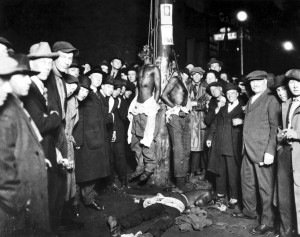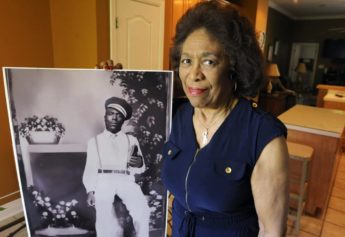
As many users pointed out on Twitter, the piece written by Campbell Robertson only mentioned the word “white” on two occasions—when she described the alleged victims of likely fabricated indiscretions by Black men who were subsequently lynched. In the first case, it was a three-year-old white girl who was allegedly sexually assaulted in Dallas that led “a group of men” to rush into the courthouse in 1910 and throw a rope around him while “a mob” yanked him from the window.
In the second case, three Black men were accused of killing a white woman and “were castrated, stabbed, beaten, tied to a plow and set afire in the spring of 1922,” all under the “gaze of hundreds of soda-drinking spectators.”
Not once did Robertson bother to tell the reader that the “group of men,” that the “mob,” that the “soda-drinking spectators” were white. It’s almost as if the always cautious Times was not completely sure of who committed the lynchings and was waiting for officials to come along from 1910 and 1922 and confirm their racial identity.
In addition, though the incredibly detailed report by the Montgomery, Alabama-based Equal Justice Initiative used the words “white terrorism” over and over to describe the effect of the lynchings on America and the Black community, the Times went out of its way to avoid that language, instead calling them “racial terror lynchings.”
The word “white” was used so many times in the report by the EJI that the Times had to avoid using any passages from the report in order to achieve the dubious distinction.
The white-washed nature of the Times coverage is a perfect illustration of the discomfort the American mainstream media has in honestly confronting the nation’s ugly racial history. FOr instance, when media commentators went after President Obama for pointing out how Christianity has been used to justify some ugly acts throughout history, such as the Crusades, slavery and Jim Crow, they all jumped on his use of the Crusades while leaving slavery and Jim Crow untouched.
In its chilling report, called “Lynching in America: Confronting the Legacy of Racial Terror,” the EJI certainly doesn’t avoid assigning the title of terrorist to the white mobs that committed unspeakable acts against Black people through the early 20th century.
The EJI defines lynchings as acts of terrorism “because these murders were carried out with impunity, sometimes in broad daylight, often ‘on the courthouse lawn,’” according to the report. “These lynchings were not ‘frontier justice,’ because they generally took place in communities where there was a functioning criminal justice system that was deemed too good for African Americans. Terror lynchings were horrific acts of violence whose perpetrators were never held accountable. Indeed, some ‘public spectacle lynchings’ were attended by the entire white community and conducted as celebratory acts of racial control and domination.”
The EJI said there were 3,959 Black people lynched in the United States between 1877 and 1950—a number that is 700 more than previously known—and Georgia, Mississippi and Louisiana had more lynchings than any other state in the country.
The report ties lynching to a broader picture of white social control, showing how lynchings affected African-American migration patterns, effectively turning many Southern communities from predominantly Black to overwhelmingly white virtually overnight and sending millions of Black people to the cities of the North to escape this terrorism. It is a significantly more nuanced view of how whites used lynching to serve particular purposes—and how lynchings were a seldom-discussed driver of the Great Migration of Black people to the North.
“Lynching—and other forms of racial terrorism—inflicted deep traumatic and psychological wounds on survivors, witnesses, family members, and the entire African-American community,” the report said. “Whites who participated in or witnessed gruesome lynchings and socialized their children in this culture of violence also were psychologically damaged. And state officials’ indifference to and complicity in lynchings created enduring national and institutional wounds that we have not yet confronted or begun to heal.”


